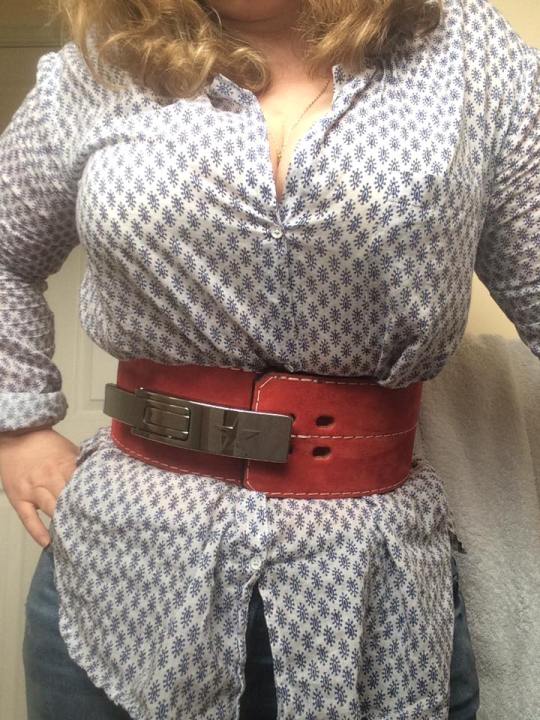
The first time I walked into a body-building gym, I felt like all my internal organs were frozen with apprehension.
I almost tiptoed in, internally apologising for my presence, trying to stick to the walls and curtsy around the exercise equipment.
I did not belong in this place.
All around me were men gazing into the mirror while flexing their biceps. Checking out their own pumped up muscles, they looked so sure of themselves. In comparison, I could barely look at myself in the mirror—I wasn’t even sure what my body looked like from my neck down. I just did not want to know; I was sure it was not pleasant. I wasn’t ready to accept the truth.
I looked around the gym, searching for a place to hide, my eyes finding the instructional poster for women—a model in a leotard with a tiny waist, big breasts, hair done and full make-up. It described, in detail, what you should do to get a “perfect body.” It was a token to decorate the woman’s section, but even with starvation and a six-sessions-a-week workout routine, I would never look like that woman.
I never had a good relationship with my body. I was a plump kid, and by five I had learned that my body was not good enough. By puberty, I had learned it was a dangerous, shameful thing that existed for other people’s pleasure. I knew it was not safe to be a woman in the world and I was terrified that as I grew, my body would expand, grow breasts, and I would become visible and attract attention.
I stopped eating. I could punish my “not good enough” body and stay tiny, invisible. I ate very little for five years, but my body still grew and I became a woman. All through my adult life, pregnancy, and motherhood, my body performed as it should. I had no love for it; it just existed.
So I found myself in the gym, and I had no idea what I was doing there, standing somewhere between fear and shame and a real feeling of not being good enough. This was where the beautiful bodies lived. The people who moved with grace, so sure of themselves that they seemed to own their space. These were people who could look at their reflection without smarting with shame and self-degradation.
Not only was I a woman, but I was an unfit woman in a bodybuilding gym. I did not qualify for entry.
The only thing that worried me more than my obviously unacceptable body was the thought of dropping a heavy weight on my chest and being pinned to the floor, slowly suffocating as my lungs collapsed. However, that was a better option than turning around and sprinting toward the exit, exposing my legging-clad buttocks to the room. Taking a deep breath, I walked toward my new trainer with a smile on my face, pretending I was just fine. That was the start of my process, learning that my body belonged to me and not to society.
It has been several years since that first training session and I am pleased to say I have never dropped anything heavy on myself. There are safety bars and people acting as spotters to make sure that does not happen.
This is what lifting heavy weights has taught me.
1. My body is a good body. I am a woman, and my body is a good body. When I look around, I see other women, all with good bodies of every shape and size. We are all valid. My body is strong and healthy and it can lift an amazing amount of weight. Now I have another barometer to tell me how good my body is and it is not the weight on a scale, it is the weight on a bar.
For the first time in my life, heavier is good.
Instead of being told to weigh less, I know that if I exercise and fuel my body with good food, I see results, and it has nothing to do with zipping myself into tiny jeans. Most days I wear lycra and it allows my body to stretch and grow beyond the tiny box society has tried to squeeze it in. I no longer torture myself with smaller sizes, being less than I am in order to fit into small clothes and small spaces.
The first physical change I noticed was that my shoulders began to broaden. I remember the mix of emotions when I tried on a fitted shirt and got my shoulders and arms completely stuck. First came a moment of shame, the familiar memory of being too big. Then I remembered that this extra chunk contained a good deal of hard-won muscle. My shoulders were stuck, but this was different. As I tried to fasten the buttons, straining over my chest, I thought of the absurd situation I was in.
Women spend a large portion of their life trying to conform to an impossible shape. It wastes so much time and energy and prevents us from doing the things that really matter, making changes in the world. The shirt was a metaphor for the constraint I experienced in life. So I took a deep breath, filled my lungs, expanded into my chest and shoulders, flexed my biceps, rounded my back and roared in frustration. A big deep, low growl. It came from the pit of my stomach, made up of all the words and anger I had swallowed over the years. Society and that shirt could go to hell. I ripped it off and threw it in the bin. I was done with playing small.
I learned that as I expanded into my back and shoulders, I worried less about my boobs. They have always been big, even when I was a skinny 14-year-old, and attracted attention which I did not have the skill to cope with. I have stopped trying to hunch my back to disguise them. Powerlifting has improved my posture and confidence. My back is straight, and my shoulders fall down and back naturally. When I walk, I am now aware of moving, from my hips and shoulders, and I don’t try to hide my breasts. I feel more confident and no longer ashamed to take up space when I walk and sit. I have had a lot of experience sitting on public transport, my legs and arms together, back hunched over, making space for a man next to me to sit wide legged with his shoulders back.
Many times I have moved out the way in a corridor or on pavement, almost apologizing for my presence, making myself as small as possible.
I had not realised how much confidence my wide shoulders and strong back had given me until I was helped out at a powerlifting competition. When a male competitor squared up and expected me to give way, I stood firmly and claimed my space in the hall. I learned that my body is a good body and it has a right to exist and take up space in the world.
2. I am stronger than I ever thought possible. I do not mean just physical strength, but, yes, my body is better equipped to deal with everyday life. Heavy doors and bags feel lighter and I move with greater ease. I know that I am better prepared for whatever life experience comes next. Strength is valuable in life and I can help others when they need it. I am valuable for more than my attractiveness, my worth is not based on a stereotype and I have more to offer. I am a woman and I am physically and mentally strong.
Strength is born through adversity and our ability to overcome it. Every time I feel the weight of a heavy load on my back, I have a fear of not being good enough, strong enough, or brave enough to stand up straight from a squat, thinking this time it might be too heavy, too difficult, that I can’t do it—all of the negative self-talk that we use. Fear, not of failing, but succeeding. Fear of putting ourselves out there and showing up. I experience that fear every time I lift the bar, but I shut my negative talk up and allow my beautiful, strong body to work. My body takes over and I stand up straight and I lock out the lift. When that happens, I know I am stronger than my fear. I am capable of more than I thought possible. I have beaten my doubts and negativity.
My personal trainer keeps a log book of my lifts, and on at least five occasions, I almost had to start from the beginning. Back pains from an old injury, bereavement, and broken ribs have all set me back and I have lost strength, having to return to training and increase strength, slowly each week a little stronger that before. Life is like that; it is never a smooth, uphill trajectory. I have learned that no matter how many times you experience a setback, you stand back up. Powerlifting has taught me that lesson. I am stronger than I ever thought possible.
3. I am only as strong as my weakest part. I have several old injuries, and not just physical. I experienced a lot of self-doubt and low self-esteem before I started powerlifting. The only way you can become stronger is by taking a good look at your broken places in daylight and getting some help to mend them.
There is no shame in admitting you need help and support. I am stronger because I built a good support team around me and being strong enough to ask for help.
I learned that in the early days, my back would give way under too much pressure—I had a weakness in my sacroiliac joint from an accident years before. With help and rehabilitation, I was able to make my back stronger and recover. For a long time, it was the fear of my back failing a lift and the resulting pain that would make me fail, not my back itself. I would not even try and give up too soon, talking myself into failure before I had started. My support group includes my trainers, chiropractor, counsellor, friends and family and an amazing team of fellow lifters at the women’s only gym where I train. We are a diverse and amazing group of strong women and we literally have each other’s backs.
Powerlifting is still seen as a male dominated sport. Women are discouraged from “bulking up” and gaining muscle as it does not look feminine. Gaining muscle and confidence to be present in the world is one of the benefits of powerlifting and is not a disadvantage.
How is feminine supposed to look? We are all different. My feminine has curves, confidence, strength, and most of all, it has freedom from restriction. I have learned how to reclaim my body through powerlifting and to grow and expand into the world. My body is an act of courage and rebellion; it exists for me and not for society. I have broken the mould.
~
For more inspiration, check out #chickswholift on Insta ~ ed
Author: Julia Williamson
Image: Courtesy of Author
Editor: Catherine Monkman











Read 1 comment and reply